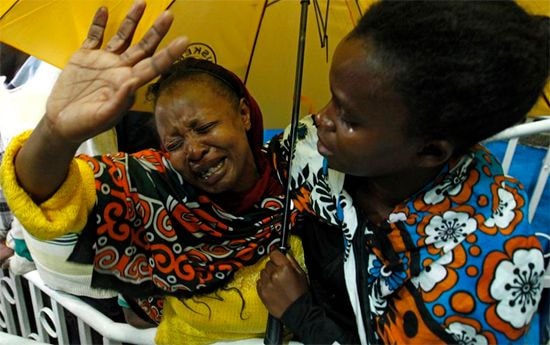Kenya: 3 days of national mourning after Garissa massacre
(Baonghean) - On Sunday, April 5, Kenya began three days of national mourning to remember the 148 victims killed in the attack on Garissa University College by the Somali Islamic terrorist group Shabab. A memorial service for the victims killed on Thursday will also be held on the campus of Garissa University College.
 |
| A mother whose child was killed in the massacre at Garissa University College in the early hours of Thursday, April 2. Photo: Reuters/Thomas Mukoya |
On Saturday evening (April 4), Kenyan President Uhuru Kenyatta announced a three-day national mourning period during which flags would be flown at half-mast across the country. In his speech, Mr. Kenyatta declared, “The government will give the best response to this attack as it will to all other attacks.” It is known that this is President Uhuru Kenyatta’s first public appearance since the massacre at the US Embassy in Nairobi in 1998 that killed 213 people.
“Despite the difficulties, we have not run away and will never run away,” President Kenyatta said, stressing that the Somali Islamist terrorist group Shabab will fail to establish a “caliphate” in Kenya. Kenyatta said Kenya will do “everything to protect its way of life,” and asked the local Muslim community to help in the fight against the extremists.
Amid criticism of the Kenyan government’s failure to stop attacks by the Islamist group Shabab, President Kenyatta said the officials responsible “will be brought to justice.” Since mid-2013, more than 400 Kenyans have been killed in attacks by the Shabab.
“The fight against terrorism is becoming extremely difficult,” President Kenyatta warned, as those planning attacks and financing them may be hidden in the community and seen as harmless or ordinary people. He also called on communities across the country, including Muslims, Somalis and Kenyans, to maintain solidarity with one another.
As for the Shabab Islamic terrorist group, after being weakened in Somalia, they moved to operate in Kenya. Kenya gradually became a fertile ground for Islamic extremism to grow as Kenya itself became increasingly weakened by corruption. After carrying out the massacre at Garissa University, the Shabab terrorist group continued to threaten to carry out new attacks and declared that it would make “blood flow on the streets of Kenya”.
Chu Thanh
According to Le Monde April 5
| RELATED NEWS |
|---|






